
MediaTek vs Snapdragon: Which is Better & Why?
Dec 31, 2025 • Filed to: Screen Lock Removal • Proven solutions
MediaTek vs. Snapdragon is one of the most searched comparisons for phone buyers in 2025—and for good reason. This guide answers your questions, whether you are wondering which is better—MediaTek or Snapdragon—or about choosing between MTK vs. Snapdragon for gaming, battery life, or camera support.
This tutorial also discusses MediaTek and Snapdragon CPUs in terms of architecture, artificial intelligence, performance, cost, and practical application differences. You’ll learn which processor heats up more, lasts longer, and offers better value for money. Ultimately, we even share a quick solution for bypassing FRP on Snapdragon devices.
Now, let’s start with what each processor brand offers.
Part 1. MediaTek vs Snapdragon: A Complete 2025 Overview
While choosing a phone, one common question arises: Which is better, Snapdragon or MediaTek?
Both chips power most Android phones today. But they are very different in performance, battery use, and features.
Let’s break down the basics of each. This will help you pick the right one in 2025.
1-1. What Is MediaTek?
MediaTek is a chip-making company based in Taiwan. Founded in 1997, it has grown rapidly in the mobile world.
- Who makes it? MediaTek Inc., from Hsinchu, Taiwan.
- Where is it popular? Mostly in Asia — India, China, and Southeast Asia.
- Which devices use it? Budget and mid-range phones, smart home devices, and Chromebooks.
- Famous chip series? Helio and Dimensity (like Dimensity 9300 and 8200).
- What makes it special? Lower price, fast updates, gaming features, and solid AI support.
MediaTek is also entering the premium 5G market. But it still leads in affordable phones.
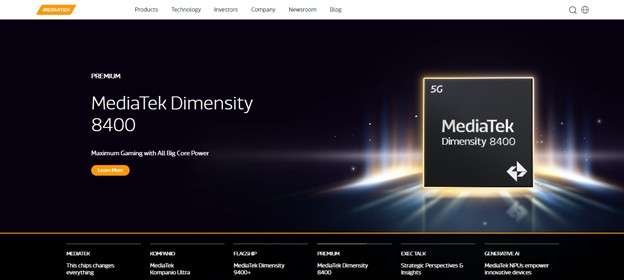
1-2. What Is Snapdragon?
Qualcomm is a tech company based in San Diego, USA, that makes Snapdragon chips. Snapdragon is often associated with high-end smartphones.
- Who makes it? Qualcomm Technologies Inc., USA.
- Where is it strong? North America, Europe, and premium global markets.
- Devices that use it? Mid-range to flagship phones, tablets, and even car systems.
- Popular chip series? Snapdragon 7 Gen 3. Gen 2.Gen 3.
- Key features? Strong AI (Hexagon DSP), great camera support, powerful 5G, custom Kryo CPU cores.
Samsung, OnePlus, and Xiaomi phones often use the Snapdragon processor, which focuses on speed, camera power, and battery efficiency.

1-3. Why This Debate Matters: MediaTek vs Snapdragon
Smartphone chipsets are the heart of mobile devices. They can affect everything—speed, battery life, gaming, and camera quality.
That’s why many people ask:
- Which chip is faster — MediaTek or Snapdragon?
- Which one is better for games?
- Which one gives longer battery life?
- Which one heats up more?
These are good questions. Most people don’t buy a new phone every year. So choosing the right chip means your phone works well for a long time.
This debate isn’t just about brand names. It’s about finding what works best for your needs — speed, value, or battery life.
Part 2. Chipset Architecture & Core Technology Comparison
Both MediaTek and Snapdragon run modern smartphones, although their internal systems are somewhat different. Every manufacturer offers special tech, from CPU cores to artificial intelligence engines. Here's a simplified breakdown.
a) CPU and GPU Performance Insights
One of the key factors in MediaTek vs Snapdragon is how they handle the CPU and GPU.
MediaTek CPU and GPU
MediaTek uses Cortex cores from ARM. These are found in almost all of their Dimensity and Helio chips.
MediaTek uses Mali GPUs for its graphics, which work well for simple and mid-level games.
CorePilot is the name of the system that MediaTek uses to control speed and power. It checks how your phone is being used and shifts tasks between cores to save battery.
Snapdragon CPU and GPU
Custom Kryo CPUs developed by Qualcomm find application in Snapdragon CPUs. These are finely designed Android app cores that run faster than usual ARM cores.
About graphics, Snapdragon makes use of the Adreno GPU, which is considered to be excellent for gaming. Long-term gaming sessions offer improved frame rates, smoother graphics, and better temperature regulation.
Moreover, Snapdragon boasts a stronger CPU-GPU balance, which makes both components ideal for multitasking or gaming specifically.
b) AI Processing and Camera Enhancements
Both MediaTek and Snapdragon have invested heavily in AI and imaging. But they take slightly different paths.
MediaTek AI and Camera
MediaTek leads in Edge AI. It uses a system called NeuroPilot. This works with the CPU, GPU, and NPU to handle AI tasks right on the device. That means your phone doesn't always need the cloud.
Its AI helps with features like:
- ● Face unlock
- ● Live photo filters
- ● Object detection
- ● Health tracking
- ● Real-time photo editing
For camera work, MediaTek uses Imagiq. It supports multi-camera phones, helping brands offer wide, macro, and zoom shots. It also improves night shots and background blur.
Snapdragon AI and Camera
Snapdragon uses the Qualcomm AI Engine. It combines powerful hardware and software. It works fast and uses less power. AI tasks run directly on the phone, keeping data private and real-time.
With AI, Snapdragon improves:
- ● Scene recognition
- ● AR effects
- ● Voice assistants
- ● Live video enhancement
- ● Smart battery saving
For the camera, Snapdragon uses custom ISPs (Image Signal Processors). These support up to 200MP photos, 8K video, and slow motion. They also improve autofocus, HDR, and low-light images.
Quick Comparison: MediaTek vs Snapdragon Specifications
Here's a side-by-side comparison to help you quickly understand the key differences between MediaTek and Snapdragon chipsets
|
Features |
MediaTek |
Snapdragon |
| CPU | ARM Cortex (Standardized) | Kryo (Custom, Qualcomm-tuned) |
| GPU | Mali | Adreno (Custom) |
| AI Engine | NeuroPilot | Qualcomm AI Engine |
| Performance | Great in mid-range | Stronger in the flagship segment |
| Power Efficiency | Improved in newer chips | Excellent across segments |
| Overheating | Can heat more under load | Better thermal optimization |
| Pricing | Budget-friendly | Usually more expensive |
| Common Use | Budget & mid-range phones | Premium & flagship devices |
Next, let’s explore how both chips perform with battery and heating control.
Part 3. Power Efficiency and Thermal Performance
Selecting MediaTek or Snapdragon goes beyond mere speed. It also relates to how effectively every chip controls heat and power. Let's examine their performance in these domains.
a) Battery Optimization and Endurance
Battery life depends heavily on how well a chipset manages power under different workloads. Here’s what each tool offers.
MediaTek:
The Dimensity 8300 is built on TSMC's 4nm process. Compared to its predecessor, it offers 20% better CPU performance and 30% improved power efficiency.
Key features include:
- HyperEngine Technology: Adjusts performance based on usage, saving battery during gaming and daily tasks.
- 5G UltraSave 3.0+: Reduces power consumption during 5G use, extending battery life.
Snapdragon:
The Snapdragon 8 Gen 2 is also manufactured using TSMC's 4nm process.
Qualcomm claims:
- 35% faster CPU performance.
- 40% better power efficiency compared to the previous generation.
Its Adreno GPU offers 25% higher performance and 45% improved power efficiency.
b) Heat Management and Thermal Control
Heat control can make or break the user experience, alongside battery life, especially during gaming or multitasking.
MediaTek:
The Dimensity 8300's HyperEngine tracks device temperature, modifying performance to preserve the best conditions for gaming. Its 4 nm design facilitates effective heat dissipation.
Snapdragon:
Thermal management techniques in the Snapdragon 8 Gen 2 help regulate heat during demanding operations.
Its adequate power distribution guarantees constant performance and prevents too much heat generation.
Now let’s see how pricing, availability, and real-world value differ.
Part 4. Price-to-Performance Ratio
Choosing a phone isn't just about power. Price also plays a significant role. MediaTek and Snapdragon both offer value, but in different ways.
Let’s see how they compare in terms of cost and availability.
Affordability Across Device Segments
MediaTek is known for its budget-friendly chips. Most of its processors are found in low to mid-range phones. This includes:
- ● Popular series include Helio and Dimensity
- ● Offering 5G, gaming support, and AI tools without a big price tag
- ● Example: Dimensity 8400 gives near-flagship performance under $500
Snapdragon, however, focuses more on premium devices. You’ll find:
- ● Top chips in phones from brands like Samsung, OnePlus, and Xiaomi.
- ● Chips like the Snapdragon 8 Gen 3 are built for performance.
- ● Support that gives faster graphics, better cooling, and advanced camera tools.
In short, if you want top-tier features, go for Snapdragon, and if you want good performance at a lower price, MediaTek is a smart choice. Your location and budget often decide which one fits best.
Before we wrap up, here’s a handy trick for Snapdragon users facing FRP lock.
Part 5. Extra Tip: How to Unlock FRP on Snapdragon-Powered Android Devices [2025 Guide]
Sometimes, even if you buy a premium phone with a Snapdragon processor, you can run into problems. One of the most common issues is FRP lock, which stands for Factory Reset Protection.
FRP is a security feature built into Android phones. It gets triggered when you reset the phone without removing the Google account. After the reset, the phone asks for the same account login, and if you forget it, you're locked out. Snapdragon-powered phones are often more secure and harder to unlock without proper steps.
That’s where FRP bypass comes in. Even for beginners, the best way to do it is to use a tool like Dr.Fone - Screen Unlock (Android).
If you’re stuck at the FRP screen, Dr.Fone – Screen Unlock (Android) offers a clean, easy way out. It’s a tool from Wondershare that helps remove the FRP lock from most Android phones, including Snapdragon models.
No need to be a tech expert. The software is simple and designed for beginners.

Dr.Fone - Screen Unlock (Android)
The Best Tool on Unlocking FRP on Snapdragon-Powered Android Devices
- Remove all Android screen locks (PIN/pattern/fingerprints/face ID) in minutes.
- Bypass the FRP lock of Samsung without a PIN or Google account.
- Everyone can handle the lock screen without any tech knowledge.
- Provide specific removal solutions to promise a good success rate.
How to Bypass FRP on Snapdragon Phones with Dr.Fone – Step-by-Step Guide
Follow these simple steps to remove the FRP lock on Android Snapdragon devices (take Samsung as an example) using Dr.Fone – Screen Unlock (Android).
Step 1: Buy a Samsung EDL engineering cable online. This cable is required to connect your phone to Emergency Download Mode.
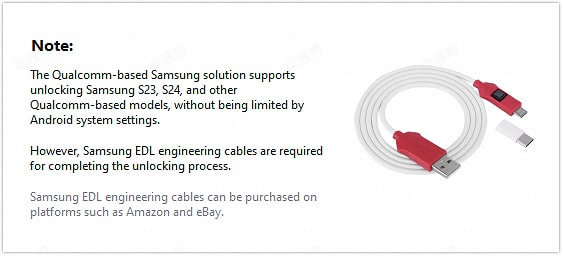
Step 2: Go to the official Wondershare website, download Dr.Fone – Screen Unlock, and install it on your Windows PC. Open the tool and click “Screen Unlock.”

Step 3: Select “Remove Google FRP Lock (Android)” from the screen. Choose Samsung as the brand, then click Start to continue.
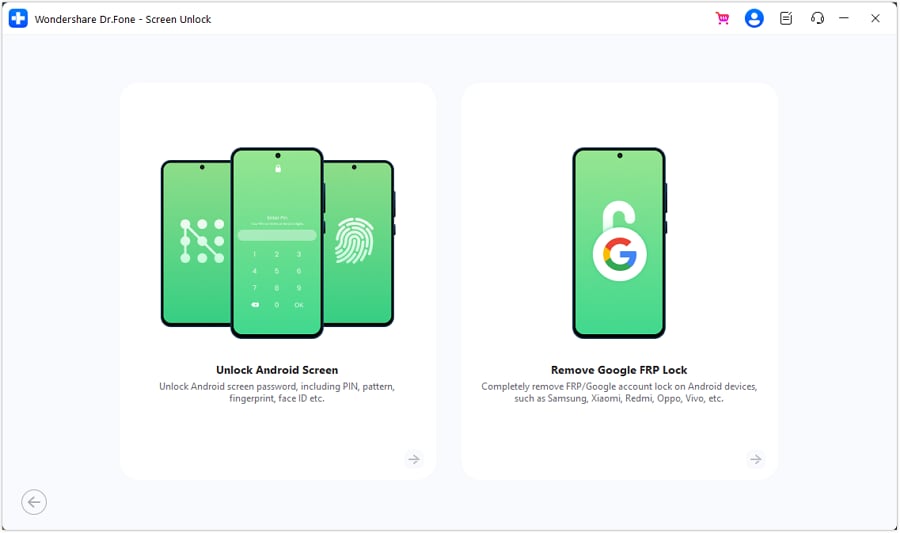
Step 4: Select Qualcomm (Snapdragon) as your phone’s chipset when asked. The tool will prepare for EDL mode. Click “OK, I got it.”
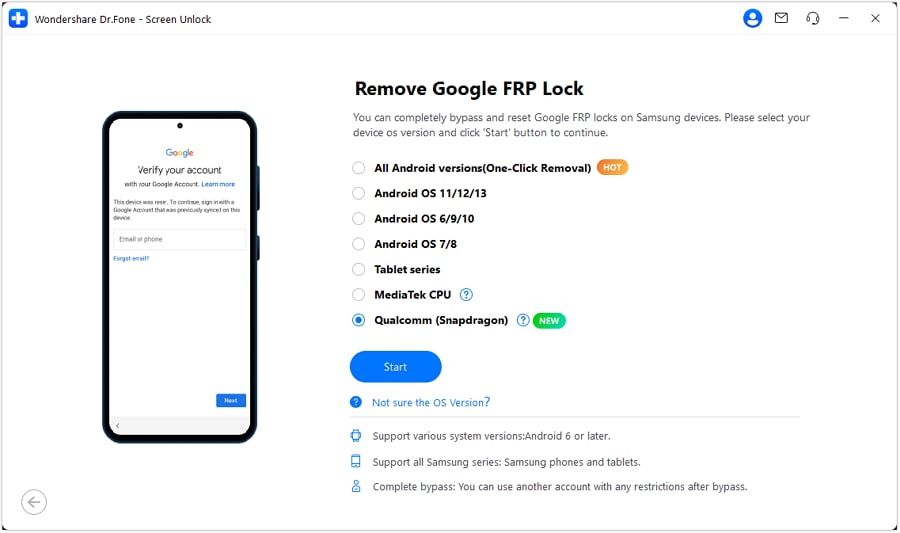
Step 5: Put your phone into EDL mode by pressing Volume Up + Down and the EDL button
while connecting the cable. The tool will then download the correct firmware.
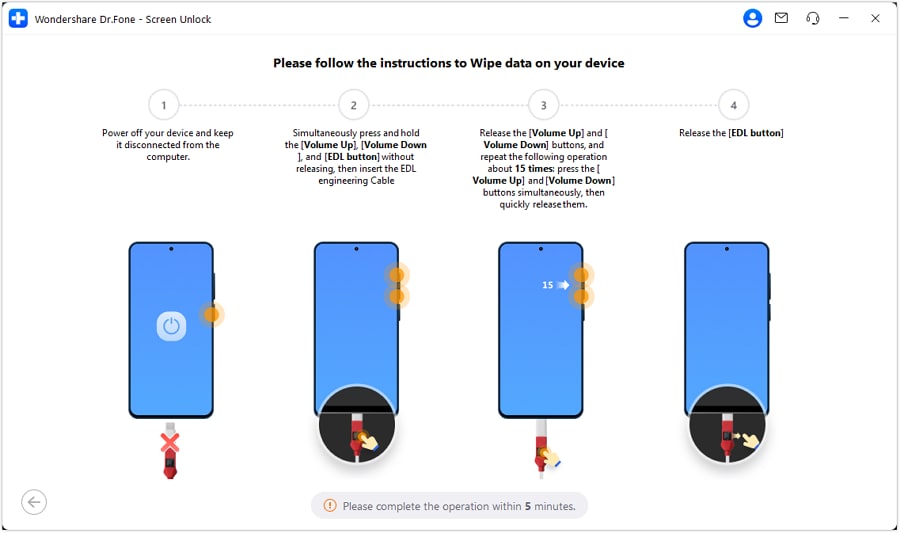
Step 6: Select your phone model in the tool (e.g., Galaxy S23). Dr.Fone will detect the device and remove the FRP lock. Once done, your phone will restart without asking for a Google account.
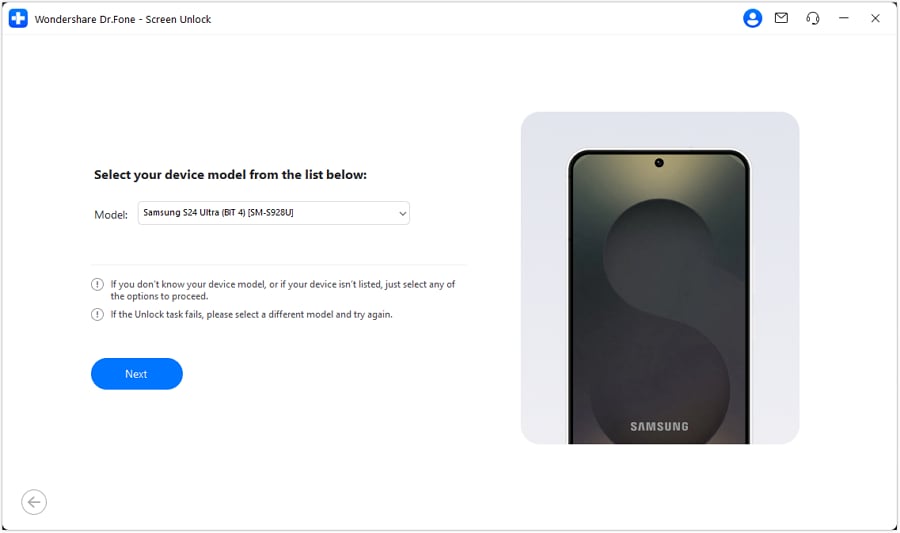
You can find the official step-by-step guide for other phone models by Dr.Fone here: Dr.Fone FRP Bypass with EDL Mode.
Conclusion
Regarding MediaTek vs Snapdragon, the correct option in 2025 will depend on your priorities. Snapdragon is the superior choice if you desire long-term software support, strong artificial intelligence processing, and upscale gaming. MediaTek, however, offers excellent value if you're seeking reasonably priced performance with high multitasking capability and battery economy.
If you're locked out of your Snapdragon device due to FRP, Dr.Fone - Screen Unlock (Android) provides a user-friendly solution to regain access.
4,624,541 people have downloaded it
Android Screen Unlock
- Unlock Android Screen
- Best Unlock Apps For Android
- Unlock Android Pattern Lock
- Bypass Android lock
- Unlock Android with Broken Screen
- Unlock Android Forgot PIN
- Unlock Without Google Account
- Unlock without Factory Reset
- Unlock Android Tablets
- Reset Locked Android Phone
- SafeUnlocks Review
- Unlock Huawei Phones
- Unlock Google Pixel Phones
- Unlock OnePlus Phones
- Unlock Vivo Phones
- Unlock Sony Xperia
- Unlock LG Phones
- Unlock Mi Pattern Lock
- Unlock OPPO Phones
- Unlock Realme Phones
- Unlock LG Phones
- Unlock Honor Phone
- Unlock Kyocera Phone
- Unlock Samsung Screen
- Bypass Samsung Lock
- Unlock Samsung Password/Pin
- Top Samsung Unlock Softwares
- Samsung Unlock Code Generator
- Get Free Samsung Unlock Codes
- Samsung Galaxy Secret Code List
- Samsung Knox Disable
- Reset Samsung Galaxy A12
- Unlock Samsung S22 Ultra
- Bypass Android FRP
- Top FRP Bypass Tools
- Disable FRP
- Bypass Android FRP
- Bypass FRP with PC
- Bypass FRP with ADB
- Bypass Google Account Verification
- Custom Binary Blocked by FRP Lock
- Bypass Google Pixel FRP
- Bypass Huawei FRP
- Huawei FRP Code
- Bypass Xiaomi/Redmi/Poco FRP
- Bypass OPPO FRP
- Bypass LG FRP
- Bypass Motorola FRP
- Bypass Lenovo FRP
- Bypass Realme FRP
- Bypass ZTE FRP
- Vivo Y15a FRP Bypass
- Moto G Pure FRP Bypass
- Bypass Samsung FRP
- Galaxy Z Fold 7 FRP Bypass
- Bypass Galaxy M01 FRP
- Bypass Samsung M11 FRP
- Bypass Samsung J5 Prime FRP
- Bypass amsung A02/A02 FRP
- Bypass Samsung A10/A10s FRP
- Bypass Samsung A12 FRP
- Bypass SamsungA20/A20S FRP
- Bypass Samsung A21/A21s FRP
- Bypass Samsung Galaxy 50 FRP
- Bypass Samsung Galaxy 51 FRP
- Bypass Samsung S7 FRP
- Bypass Samsung Galaxy S22 FRP
- FRP Bypass Tools



















James Davis
staff Editor